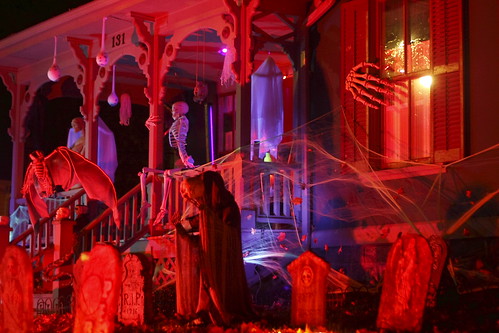Blogger friends inspire the most creative and connected blog entries. The verbose and gentleman scholar Matt Anderson, after doing a wonderful Halloween countdown on his blog, wrote about the pagan summer festival Beltane/ . Matt happens to live in Australia, so it's technically not time Samhain in the land down under, or the harvest festival that precludes Halloween and inspired it.
Image source: http://farm2.staticflickr.com/1101/5120015171_420b316aa8.jpg
We Americans, unless we practice Wicca, do not have Samhain. We have trick-or-treating, Halloween specials, haunted houses and costumes. These aspects are not bad things, because we no longer have a reason to fear winter. Americans, and most of the Western world, have access to food and shelter all year round. I for one live in Florida, where we have vegetables and fruits growing in the middle of December, and my family is lucky to have food and an insulated house every day. Not because of the cold, but because of the rodents that would take nibbles out of our tomatoes at night, and they would freak out my mom and older sister. Also, we had to watch our tomatoes and bananas more carefully.
Image source: http://farm3.staticflickr.com/2263/1794529842_6147e4392a.jpg
For civilizations that lacked preservatives, refrigeration and mass-production of food, however, winter was a scary time. People had to fight for their lives, and witness the world dying around them. Food would become scarce, blizzards would bury villages for weeks, the cold could freeze over cattle's nostrils, and people would huddle in their homes while listening to monster tales. Rats and mice would huddle with them, stealing whatever food they could find. It was a time when ordinary people feared Grendel the monster storming their homes in the dead of winter, eating the bravest warriors and taking no heed of weapons. Even if Grendel was no more real than the dragon that St. George fought, or the Headless Horseman, but nature was not friendly with ice and snow.
Samhain in the olden times meant preparing for the winter, celebrating the harvest that would feed villages while offering deference to the wild, natural forces. People would light bonfires, set cattle bones ablaze as a promise of life in the cold, and take a portion of the flame home to enliven their hearths.
Image source: http://farm6.staticflickr.com/5203/5319305597_10d8b2eb92_o.jpg
In addition to warmth that battled the cold, people prepared for fae, or ancient spirits, to cross over into our world. For this day, October 31st, people would leave out food offerings to feed the spirits and make room for dead family members at the dinner table. Others would wear costumes and go from house to house, to imitate the spirits in their demands for food and treats. Imitation was apparently a form of flattery, for the spirits encouraged this sort of behavior each year.
Samhain makes for an interesting holiday because it begs one fascinating question: how has our fear changed, and how did changing fears change this festival into a secular holiday? As noted above, though people still go hungry each year, most Americans don't and in fact suffer the opposite problem with obesity. Parents now worry about sugar highs and crashes, if their kids can handle haunted houses and horror movies.
For me, Halloween is having a secure net of fear. We invite scary things when dressing up because we know that they can't hurt us, and in this way we court death, treating our worst fears like playmates. We get to change into other creatures, to entertain our friends and walk into the night.
On that note, I didn't wear a proper Halloween costume this year. That won't stop me from planning for next year, for dressing up for one day as someone else. Perhaps I'll find a fairy spirit to imitate, or a Disney princess to emulate.
But for now? I'll just sit back, await the green winter to come, and enjoy the darkness.
Image source: http://farm2.staticflickr.com/1101/5120015171_420b316aa8.jpg
We Americans, unless we practice Wicca, do not have Samhain. We have trick-or-treating, Halloween specials, haunted houses and costumes. These aspects are not bad things, because we no longer have a reason to fear winter. Americans, and most of the Western world, have access to food and shelter all year round. I for one live in Florida, where we have vegetables and fruits growing in the middle of December, and my family is lucky to have food and an insulated house every day. Not because of the cold, but because of the rodents that would take nibbles out of our tomatoes at night, and they would freak out my mom and older sister. Also, we had to watch our tomatoes and bananas more carefully.
Image source: http://farm3.staticflickr.com/2263/1794529842_6147e4392a.jpg
For civilizations that lacked preservatives, refrigeration and mass-production of food, however, winter was a scary time. People had to fight for their lives, and witness the world dying around them. Food would become scarce, blizzards would bury villages for weeks, the cold could freeze over cattle's nostrils, and people would huddle in their homes while listening to monster tales. Rats and mice would huddle with them, stealing whatever food they could find. It was a time when ordinary people feared Grendel the monster storming their homes in the dead of winter, eating the bravest warriors and taking no heed of weapons. Even if Grendel was no more real than the dragon that St. George fought, or the Headless Horseman, but nature was not friendly with ice and snow.
Samhain in the olden times meant preparing for the winter, celebrating the harvest that would feed villages while offering deference to the wild, natural forces. People would light bonfires, set cattle bones ablaze as a promise of life in the cold, and take a portion of the flame home to enliven their hearths.
Image source: http://farm6.staticflickr.com/5203/5319305597_10d8b2eb92_o.jpg
In addition to warmth that battled the cold, people prepared for fae, or ancient spirits, to cross over into our world. For this day, October 31st, people would leave out food offerings to feed the spirits and make room for dead family members at the dinner table. Others would wear costumes and go from house to house, to imitate the spirits in their demands for food and treats. Imitation was apparently a form of flattery, for the spirits encouraged this sort of behavior each year.
Samhain makes for an interesting holiday because it begs one fascinating question: how has our fear changed, and how did changing fears change this festival into a secular holiday? As noted above, though people still go hungry each year, most Americans don't and in fact suffer the opposite problem with obesity. Parents now worry about sugar highs and crashes, if their kids can handle haunted houses and horror movies.
For me, Halloween is having a secure net of fear. We invite scary things when dressing up because we know that they can't hurt us, and in this way we court death, treating our worst fears like playmates. We get to change into other creatures, to entertain our friends and walk into the night.
Image source: http://farm4.staticflickr.com/3070/2991438531_2ef689fd03.jpg
On that note, I didn't wear a proper Halloween costume this year. That won't stop me from planning for next year, for dressing up for one day as someone else. Perhaps I'll find a fairy spirit to imitate, or a Disney princess to emulate.
But for now? I'll just sit back, await the green winter to come, and enjoy the darkness.








